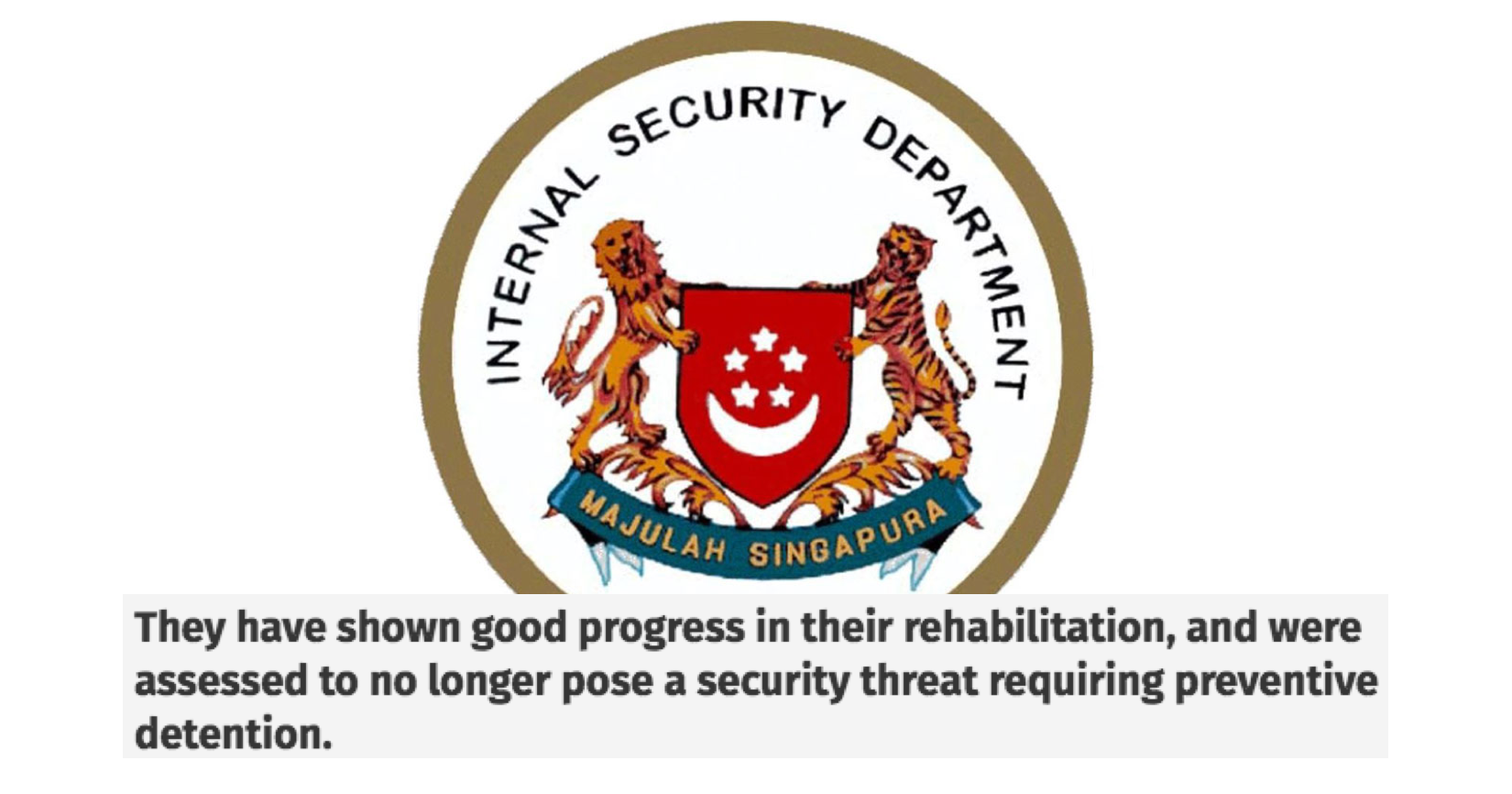Singaporeans who have been detained under the Internal Security Act (ISA) but have shown good progress in their rehabilitation may be released from detention and placed on Restriction Order (RO).
Those who do so have been assessed to no longer pose a security threat that necessitates detention.
Release from Detention, placed on Restriction Orders
ISD stated that three Singaporeans who were detained under the ISA for involvement in terrorism-related activities have been released, and placed on ROs.
ISD added, "They have shown good progress in their rehabilitation and were assessed to no longer pose a security threat requiring preventive detention."
1. Muhammad Fadil bin Abdul Hamid, 31, a self-radicalised individual previously detained under the ISA from 2010 to 2012 for intending to engage in armed violence in Afghanistan.
He was placed on an RO in 2012, but detained again in 2016 as he believed in militant jihad and harboured the intention to fight alongside ISIS or other militant groups in Syria.
He was released and placed on an RO in April 2020.
2. Husaini bin Ismail, 61, a former Jemaah Islamiyah (JI) member who was detained under the ISA in June 2012, following his deportation to Singapore from Indonesia in May 2012.
Husaini had fled Singapore in December 2001.
While on the run, he was involved in the plot to hijack an airplane and crash it into Changi Airport in January 2002. Husaini was released on a RO in June 2020.
3. Rosli bin Hamzah, 54, a self-radicalised individual who was detained under the ISA in August 2016.
Rosli harboured the intention to travel to Syria to fight alongside ISIS. Rosli was released on a RO in August 2020. He was radicalised after regularly listening to a radio station from Batam, Indonesia that spread extremist views.
Lapse of Restriction Orders due to progress in rehabilitation
ISD also gave an update on the lapse of the Restriction Orders of five Singaporeans that have expired, as they have shown good progress in their rehabilitation.
1. Mohamed Mohideen bin Mohamed Jais, 30, who had performed armed sentry duties in Yemen while pursuing religious studies there from 2009 to 2011. He was issued with an RO in March 2016, which was allowed to lapse in March 2020.
2. Mohamad Reiney bin Noor Mohd, 30, a self-radicalised individual who started supporting ISIS after encountering their online propaganda. He was issued with an RO in August 2016. His RO was allowed to lapse in August 2020.
3. Asrul bin Alias, 30, a self-radicalised individual who actively searched for pro-ISIS materials online and shared them on Facebook and WhatsApp with the intention to spread ISIS’s ideology. He was issued with an RO in August 2016. His RO was allowed to lapse in August 2020.
4. Ishak s/o Mohamed Noohu, 59, a former JI member who was detained in November 2006 and released on RO in November 2012. Ishak had fled Singapore in the wake of the security operations against the JI network in December 2001.
While on the run, he was involved in the plot to hijack an airplane and crash it into Changi Airport in January 2002. His RO was allowed to lapse in October 2020.
5. An unnamed self-radicalised Singaporean ISIS supporter who was 17 years old in July 2016 when he was issued with an RO. His RO was allowed to lapse in July 2020.
Singapore's community-based approach
Singapore takes an interventionist approach to dealing with radicalisation and works closely with the community and religious leaders to help fight the influence of extremist ideas.
In a speech on Nov. 24, 2020, Minister for Law and Home Affairs K Shanmugam spoke of the need for community leaders to provide "calm, credible authoritative" voices to help drown out hate speech.
In a Facebook post in November 2018, Minister-in-charge of Muslim Affairs Masagos Zulkifli highlighted the work of the Religious Rehabilitation Group, and commended them for helping to save individuals from doing harm to themselves, their loved ones and other Singaporeans.
Related story
We deliver more stories to you on LinkedIn
Top image from ISD.
If you like what you read, follow us on Facebook, Instagram, Twitter and Telegram to get the latest updates.
